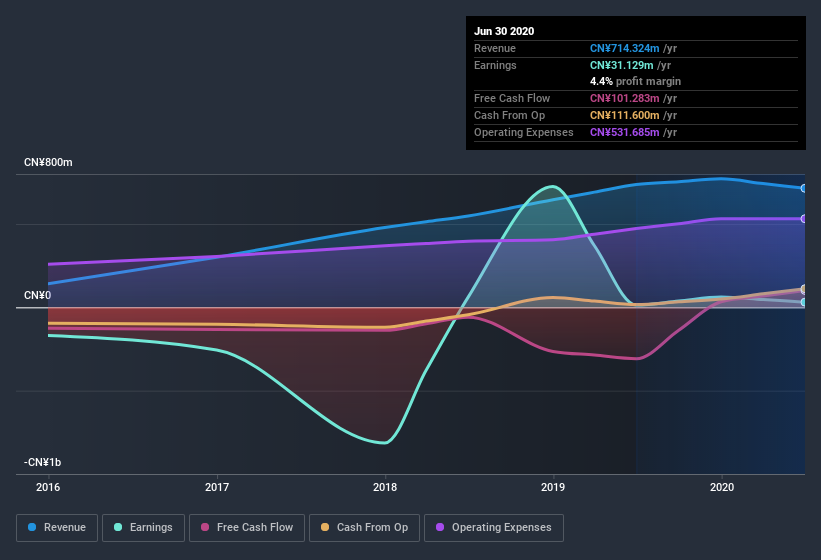- Hong Kong
- /
- Consumer Services
- /
- SEHK:1739
Are Qeeka Home (Cayman)'s (HKG:1739) Statutory Earnings A Good Guide To Its Underlying Profitability?
As a general rule, we think profitable companies are less risky than companies that lose money. That said, the current statutory profit is not always a good guide to a company's underlying profitability. This article will consider whether Qeeka Home (Cayman)'s (HKG:1739) statutory profits are a good guide to its underlying earnings.
It's good to see that over the last twelve months Qeeka Home (Cayman) made a profit of CN¥31.1m on revenue of CN¥714.3m. The good news is that the company managed to grow its revenue over the last three years, and also move from loss-making to profitable.
View our latest analysis for Qeeka Home (Cayman)

Not all profits are equal, and we can learn more about the nature of a company's past profitability by diving deeper into the financial statements. As a result, today we're going to take a closer look at Qeeka Home (Cayman)'s cashflow, and unusual items, with a view to understanding what these might tell us about its statutory profit. Note: we always recommend investors check balance sheet strength. Click here to be taken to our balance sheet analysis of Qeeka Home (Cayman).
A Closer Look At Qeeka Home (Cayman)'s Earnings
In high finance, the key ratio used to measure how well a company converts reported profits into free cash flow (FCF) is the accrual ratio (from cashflow). In plain english, this ratio subtracts FCF from net profit, and divides that number by the company's average operating assets over that period. This ratio tells us how much of a company's profit is not backed by free cashflow.
Therefore, it's actually considered a good thing when a company has a negative accrual ratio, but a bad thing if its accrual ratio is positive. While it's not a problem to have a positive accrual ratio, indicating a certain level of non-cash profits, a high accrual ratio is arguably a bad thing, because it indicates paper profits are not matched by cash flow. Notably, there is some academic evidence that suggests that a high accrual ratio is a bad sign for near-term profits, generally speaking.
For the year to June 2020, Qeeka Home (Cayman) had an accrual ratio of -0.46. That implies it has very good cash conversion, and that its earnings in the last year actually significantly understate its free cash flow. In fact, it had free cash flow of CN¥101m in the last year, which was a lot more than its statutory profit of CN¥31.1m. Given that Qeeka Home (Cayman) had negative free cash flow in the prior corresponding period, the trailing twelve month resul of CN¥101m would seem to be a step in the right direction. However, that's not all there is to consider. We can see that unusual items have impacted its statutory profit, and therefore the accrual ratio.
How Do Unusual Items Influence Profit?
While the accrual ratio might bode well, we also note that Qeeka Home (Cayman)'s profit was boosted by unusual items worth CN¥11m in the last twelve months. While it's always nice to have higher profit, a large contribution from unusual items sometimes dampens our enthusiasm. When we analysed the vast majority of listed companies worldwide, we found that significant unusual items are often not repeated. And, after all, that's exactly what the accounting terminology implies. If Qeeka Home (Cayman) doesn't see that contribution repeat, then all else being equal we'd expect its profit to drop over the current year.
Our Take On Qeeka Home (Cayman)'s Profit Performance
In conclusion, Qeeka Home (Cayman)'s accrual ratio suggests its statutory earnings are of good quality, but on the other hand the profits were boosted by unusual items. Based on these factors, we think that Qeeka Home (Cayman)'s profits are a reasonably conservative guide to its underlying profitability. In light of this, if you'd like to do more analysis on the company, it's vital to be informed of the risks involved. At Simply Wall St, we found 1 warning sign for Qeeka Home (Cayman) and we think they deserve your attention.
Our examination of Qeeka Home (Cayman) has focussed on certain factors that can make its earnings look better than they are. But there is always more to discover if you are capable of focussing your mind on minutiae. For example, many people consider a high return on equity as an indication of favorable business economics, while others like to 'follow the money' and search out stocks that insiders are buying. So you may wish to see this free collection of companies boasting high return on equity, or this list of stocks that insiders are buying.
If you decide to trade Qeeka Home (Cayman), use the lowest-cost* platform that is rated #1 Overall by Barron’s, Interactive Brokers. Trade stocks, options, futures, forex, bonds and funds on 135 markets, all from a single integrated account. Promoted
Valuation is complex, but we're here to simplify it.
Discover if Qeeka Home (Cayman) might be undervalued or overvalued with our detailed analysis, featuring fair value estimates, potential risks, dividends, insider trades, and its financial condition.
Access Free AnalysisThis article by Simply Wall St is general in nature. It does not constitute a recommendation to buy or sell any stock, and does not take account of your objectives, or your financial situation. We aim to bring you long-term focused analysis driven by fundamental data. Note that our analysis may not factor in the latest price-sensitive company announcements or qualitative material. Simply Wall St has no position in any stocks mentioned.
*Interactive Brokers Rated Lowest Cost Broker by StockBrokers.com Annual Online Review 2020
Have feedback on this article? Concerned about the content? Get in touch with us directly. Alternatively, email editorial-team@simplywallst.com.
About SEHK:1739
Qeeka Home (Cayman)
Operates online interior design and construction platform in the People’s Republic of China.
Excellent balance sheet and good value.
Market Insights
Community Narratives



